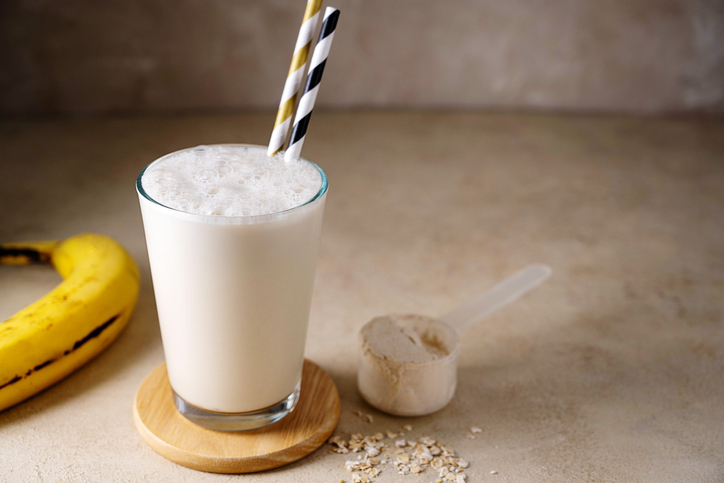As we reach the end of January, how many of us have abandoned our resolutions for the new year? Whether it’s adopting a healthier diet, committing to regular exercise, or making other lifestyle changes, the desire to enhance our wellbeing is a common theme for the promises we make ourselves, but how do you know whether the changes you’re planning to make will be right for you and your body? And how can you stick to the changes for longer?
That’s where we come in! The Living DNA Wellbeing kit can help you to understand how your body is genetically predisposed to respond to diet and exercise, to help you to maximise your potential. When you understand why you're responding in a certain way you can motivate yourself to keep going for longer!
The Wellbeing reports are split into two parts: Nutrition and Fitness, so let’s take a look at what you could learn about your own body.
Nutrition
The Living DNA Wellbeing test delves into your genetic code to reveal key nutritional traits that play a crucial role in you making informed decisions about your diet. Here’s a glimpse into the nutritional traits covered by the test:
Vitamin D Response: Vitamin D is a crucial nutrient for bone health, immune function, and more. Your body does use sunlight for Vitamin D productions, but we look at a genetic marker involved in metabolising Vitamin D from food sources.

Oily fish like salmon, mackerel, sardines, and tuna are rich in Vitamin D, as are egg yolks and mushrooms.
Did you know that absorbing sunlight through a window can notably decrease its vitamin D benefits?
Vitamin C Response: Vitamin C is an antioxidant which is essential for immune support and collagen production. We look at one genetic marker involved in metabolising Vitamin C, that could have an impact on how your body is predisposed to process it.

You can add more Vitamin C to your diet by eating raw raw dark greens like spinach and broccoli, or from unprocessed fruits such as berries, papaya, guava, kiwi, and citrus.
Vitamin B12 Response: Understand how your body is genetically predisposed to process Vitamin B12. This vitamin is important for nerve function, red blood cell production, and energy metabolism. We look at one genetic marker involved in determining how your body is genetically predisposed to process Vitamin B12.

Vitamin B12 is found in meat, fish, shellfish, and eggs. If you follow a vegetarian or vegan diet, you can find it in fortified foods, such as cereals and plant-based milk. There are also supplements available.
Vitamin A response: Vitamin A is vital for vision, immune function, and skin health. We examine two genetic markers involved in how your body is set up to metabolise Vitamin A.

Vitamin A can be found in lots of different foods - from red and orange fruit and veg like carrots, bell peppers, and papaya, to green foods like spinach that hide their red pigment of Vitamin A behind extra chlorophyll, all the way to animal products like eggs, salmon, and liver.
Remember that consuming Vitamin A in excess can be harmful, especially if you’re pregnant.
Omega-3 Response: Omega-3 fatty acids are known for their heart and brain benefits. We examine one genetic marker that can influence your predisposition to metabolising Omega-3.

You can add more Omega-3 to your diet with oily fish and leafy greens, or flaxseed, walnuts, and chia seeds.
Lactose Tolerance: Most of the population of the world is intolerant to lactose - a sugar found in milk - as are most adult mammals. The genes responsible for digesting dairy are found most often in European populations as historic hardship and famine meant that those who could eat dairy were more likely to survive and pass on their genes to the next generation.

We examine one genetic marker that can influence your ability to digest dairy.
There are now many dairy free options available if you’d like to reduce your dairy intake for any reason - from butter and cheese through to chocolate and ice cream!
Celiac Disease Risk: Celiac disease is an autoimmune disorder which is triggered by gluten consumption. We examine two genetic markers which are known to influence celiac disease.

Celiac disease is one way your body might react negatively to gluten. It is not the same as gluten intolerance or sensitivity. Other gluten-related issues include wheat allergies, gluten sensitivity, gluten ataxia and dermatitis herpetiformis. The Wellbeing Test just looks at genetic risk factors linked with celiac disease.
Carbohydrates and Sugars Response: Gain insights into how your body regulates the concentration of glucose in the blood, keeping it from dipping and spiking. We examine one genetic marker that influences how your body processes carbohydrates into glucose.

Carbohydrates that we eat get broken down into glucose by the body. The rate at which blood glucose is impacted depends on the type and amount of carbohydrates consumed as well any other kinds of foods that may have been consumed alongside.
Adequate carbohydrate intake is considerably variable based on lifestyle - if you’re interested in building muscle, you may need an exercise routine better suited for a high-carb intake, for example.
Fitness
Beyond nutrition, the Living DNA Wellbeing test provides valuable insights into your genetic predispositions related to fitness. Understanding these traits can help you to optimise your exercise routine for better results. Here are the fitness traits covered by the test.
Endurance - Oxygen Flow: Your genes influence how well your body delivers oxygen to and provides energy for your working muscles during prolonged activities. We examine one genetic marker involved in oxygen flow.

Find out whether you may or may not benefit from more intense activity, such as circuit training and recreational sports.
Maximum Strength: Muscular strength is the ability of our muscles to produce force in given movements. Large numbers of individual muscle fibres make up a single muscle and it is these fibres that must contract in a coordinated manner to create muscular force.

Could your muscles perform best with heavier weights at lower reps, or lighter weights with more reps? We examine one marker that can contribute to your maximum strength to help you find the answer.
Recovery speed: Unaccustomed exercise often causes damage in skeletal muscle, which causes loss of muscular strength, reduced range of motion, muscle soreness and swelling, and elevated blood concentrations of muscle proteins. We examine one genetic marker that can influence how quickly your body recovers from this damage.

Consuming protein after exercise can help your muscles to recover.
If you’re considering beginning a new exercise routine, this result can help you to plan your rest days effectively, but please take care to understand your limits and consult a professional before making major changes in your activity.
Tendon Durability: Learn about your genetic predisposition regarding tendon durability, essential for injury prevention in exercise. We examine one genetic marker that contributes to the durability of your tendons.

You can support your tendons by giving your body time to adapt to any new activity. Be careful not to build muscle too quickly, as it can pull the tendon at a rate greater than it has adapted to.
Endurance - Trainability: Understand how trainable your body is for endurance activities, which can help guide your approach to long-distance training.

We examine one marker that can affect your body’s trainability.
From walking to burpees, you might consider a variety of activities of mixed intensity to build endurance.
Endurance - Blood Vessel Response: Explore how your genetics might influence the way your blood vessels respond to exertion during endurance activities, which can in turn influence your cardiovascular health.

We examine one genetic marker that can influence your blood vessel response.
Having naturally more or less dilated blood vessels can affect the level of oxygen transported in your bloodstream to your muscles. Greater oxygenation can enable more prolonged exercise.
Important Considerations
It’s crucial to note that the Living DNA Wellbeing test is not diagnostic and cannot predict the development of diseases or conditions. It is just one of many tools you can use together to help you achieve your goals.
Always consult a physician before making significant dietary or lifestyle changes, as DNA is just one piece of the puzzle, and lifestyle factors play a significant role in gene expression. Your genetic predispositions may not necessarily impact your current health status.
Armed with the knowledge that the Living DNA test offers, you can make more informed decisions about yout nutrition and fitness journey, tailoring your approach to align with your unique genetic traits by using a holistic approach to wellbeing that includes a combination of genetic awareness, lifestyle choices, and professional guidance.
